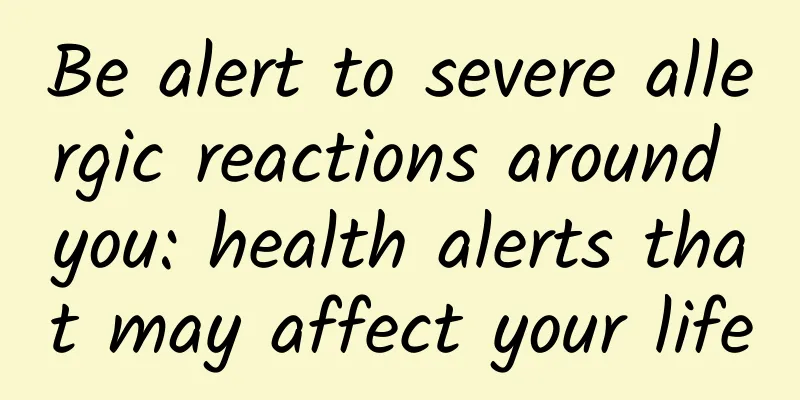Be alert to severe allergic reactions around you: health alerts that may affect your life

|
Although allergies are very common in daily life, they should not be underestimated. Severe cases may be life-threatening! Recently, a patient developed nausea, abdominal pain, and diarrhea after eating seafood. Initially, no attention was paid to the patient until he felt chest tightness and difficulty breathing. He was then admitted to the hospital for treatment and was out of danger after emergency treatment. How to identify allergic reactions and how to save yourself? Follow the editor to learn! What is a severe allergic reaction? Severe allergic reactions refer to sudden, very serious, and even life-threatening systemic allergic reactions that occur after our bodies come into contact with allergens. Its main characteristic is that life-threatening problems will quickly occur in the respiratory or circulatory systems. This type of severe allergic reaction can happen to anyone, regardless of your age, but children are more likely to be affected. What are the symptoms of a severe allergic reaction? 1. Skin and mucous membrane symptoms Common early symptoms of severe allergies. The skin of the whole body is itchy and red, and a rash like a wheal will develop, and edema will occur. Patients often feel itchy in the palms of their hands, soles of their feet, and scalp, and this itching gradually spreads throughout the body. 2. Respiratory symptoms There may be wheezing, coughing, difficulty breathing, hoarseness, laryngeal edema, etc. Special attention should be paid to laryngeal edema, which is very dangerous and may block the respiratory tract and cause suffocation. 3. Circulatory system symptoms The blood pressure drops, causing dizziness, palpitations, general fatigue, drowsiness, and in severe cases, loss of consciousness or fainting. 4. Digestive system symptoms There will be crampy pain in the abdomen, repeated vomiting and diarrhea. 5. Neurological symptoms You may have a headache, feel irritable, or become confused. Severe allergic reactions can be life-threatening, so early detection is very important. You should know that the above symptoms may not all appear at the same time. As long as two or more of the above symptoms appear within a few minutes or hours, you should consider whether a systemic severe allergic reaction has occurred! Image source: Pixabay Causes of severe allergic reactions There are many causes of severe allergic reactions. Common allergens include food (such as wheat, seafood, nuts, etc.), drugs (such as antibiotics, antipyretics, analgesics, etc.), various pollens, insect venom (bee, wasp stings), etc. In addition to the above common factors, exercise, fever, acute infection, premenstrual period, emotional stress, alcohol, etc. may also induce or aggravate severe allergic reactions. What should I do if a severe allergic reaction occurs? Self-rescue and first aid measures are critical! In case of severe allergic reaction, first aid is required immediately: 1. Get away from suspected allergens quickly If you know the allergen, stay away from it immediately. For example, if you are allergic to a certain food, stop using it immediately; if you are allergic to insect bites, clean up the insect residue as soon as possible. 2. Maintain a proper posture If your blood pressure drops, you need to lie flat with your legs raised to increase the amount of blood returning to your heart and improve blood circulation. If you have difficulty breathing or vomiting, you can remain sitting. 3. Use adrenaline If conditions permit, epinephrine can be injected intramuscularly, which is the first choice emergency medicine for treating severe allergic reactions. 4. Call 120 emergency number immediately Seek professional medical assistance. How can I prevent severe allergic reactions? 1. Allergen testing For people who are prone to allergies, it is recommended to undergo allergen testing to know clearly what they are allergic to and try to avoid allergens in life. 2. Develop good living habits Maintain a regular schedule, eat a balanced diet, and exercise moderately to enhance the body's immunity and reduce the occurrence of allergic reactions. 3. Pay attention to food safety If you are not sure whether you are allergic to a certain food, eat a little less the first time and observe your body's reaction closely. Source: Chongqing Banan District Second People's Hospital Audit experts: Du Guo, Bao Zhonghui Statement: Except for original content and special notes, some pictures are from the Internet. They are not for commercial purposes and are only used as popular science materials. The copyright belongs to the original authors. If there is any infringement, please contact us to delete them. |
<<: Common viruses and viral myocarditis in children
Recommend
Popularize science first to prevent and treat eye diseases, and protect the elderly with a beautiful "vision"
As they age, the visual function of most elderly ...
Treatment for colds in pregnant women
It is a very serious problem for pregnant women t...
Does ectopic pregnancy require surgery?
There are many treatments for ectopic pregnancy a...
Menstruation comes once every two months
Menstruation is very important for women. Under n...
Can a 9-month-old child eat meat? What should a 9-month-old child pay attention to when eating meat?
We all know that when babies grow up to a certain...
Reasons for pregnant women to sweat while sleeping
Many pregnant women will find that their bodies b...
Does cervical erosion cyst require surgery?
As we all know, cervical erosion is a type of chr...
What is the cause of breast milk?
We all know that breasts of women who are breastf...
39 weeks pregnant with bloody vaginal discharge
The early and late stages of pregnancy are the mo...
How to use barbecue flavor? What do you need to prepare for a self-service barbecue?
From the Neolithic Age to the Pre-Qin period, roa...
Leucorrhea is transparent, a little light yellow and has no smell
After a woman's secondary sexual characterist...
What is the cause of excessive vaginal discharge?
If women want to have a healthy baby as soon as p...
How to supplement calcium effectively during lactation
We know that during pregnancy, the elderly in the...
My menstrual blood suddenly smells really bad.
Menstruation is a sign of the maturation of a wom...
How to relieve the discomfort of menstruation
Almost all women have experienced dysmenorrhea. M...









